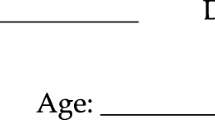Abstract
Scores on “irrational beliefs” inventories usually correlate well with scores on questionnaires about emotional feeling states, consistent with central tenets of RET and cognitive therapy. However, without specific demonstrations of beliefs inventories' discriminant validity, it is possible that they would correlate well withany questionnaire about negative states or events, thus limiting conclusions about links between thoughts and feelings. In a test of the discriminant validity of the Common Beliefs Survey (CBS), we examined responses to a battery of questionnaires on beliefs and emotional states that had been administered to 151 subjects drawn from samples of college students, hospital staff members, mental health center outpatients, and state hospital inpatients. Results were that the CBS shows (a) satisfactory internal consistency; (b) discriminant validity in that its subscales on self-criticism and perfectionism clearly differentiate clinical from nonclinical subjects; (c) the predicted strong correlations with questionnaires on emotional feeling states; (d) convergent validity in showing a strong correlation with another beliefs inventory; and (e) discriminant validity in correlating more strongly with the other beliefs inventory than with most of the questionnaires on feeling states. The CBS thus shows some respectable psychometric properties that justify its further refinement as a clinical instrument.
Similar content being viewed by others
References
Beck, A.T., Rush, A.J., Shaw, B.F., & Emery, G. (1979).Cognitive therapy of depression. New York: Guilford.
Bessai, J.L. (1977, June).A factored measure of irrational beliefs. Paper presented at the Second National Conference on Rational-Emotive Therapy, Chicago.
Fichten, C.S., Amsel, R., & Robillard, K. (1988). Issues in cognitive assessment: Task difficulty, reactivity of measurement, thought listing versus inventory approaches, and sequences versus frequency counts.Behavioral Assessment, 10, 399–425.
Goldfried, M.R., & Sobocinski, D. (1975). Effect of irrational beliefs on emotional arousal.Journal of Consulting and Clinical Psychology, 43, 504–510.
Gong-Guy, E., & Hammen, C. (1980). Causal perceptions of stressful events in depressed and nondepressed outpatients.Journal of Abnormal Psychology, 89, 662–669.
Harrell, T.H., Chambless, D.L., & Calhoun, J.F. (1981). Correlational relationships between self-statements and affective states.Cognitive Therapy and Research, 5, 159–173.
Jones, R. (1968).A factored measure of Ellis' irrational belief system with personality and maladjustment correlates. Unpublished doctoral dissertation, Texas Technical College, Lubbock.
Kendall, P.C., & Korgeski, G.P. (1979). Assessment and cognitive-behavioral interventions.Cognitive Therapy and Research, 3, 1–21.
Malouff, J.M., Valdenegre, J., & Schutte, N.S. (1987). Further validation of a measure of irrational belief.Journal of Rational-Emotive Therapy, 5, 189–193.
Novaco, R.W. (1975).Anger control: The development and evaluation of an experimental treatment. Lexington, MA: Heath and Co.
Parks, C.W., & Hollon, S.D. (1988). Cognitive assessment. In A.S. Bellack & M. Hersen (Eds.),Behavioral assessment: A practical handbook (3rd. Edn.). New York: Pergamon. (Pp. 161–212.)
Smith, T.W. (1982). Irrational beliefs in the cause and treatment of emotional distress: A critical review of the rational-emotive model.Clinical Psychology Review, 2, 505–522.
Smith, T.W. (1989). Assessment in rational-emotive therapy: Empirical access to the ABCD model. In M.E. Bernard & R. DiGiuseppe (Eds.),Inside rational-emotive therapy: A critical appraisal of the theory and therapy of Albert Ellis. San Diego: Academic Press. (Pp. 135–153.)
SPSS, Inc. (1983).SPSSx users' guide. New York: McGraw-Hill.
Thorpe, G.L., Barnes, G.S., Hunter, J.E., & Hines, D. (1983). Thoughts and feelings: Correlations in two clinical and two nonclinical samples.Cognitive Therapy and Research, 7, 565–574.
Thorpe, G.L., Freedman, E.G., & McGalliard, D.W. (1984). Components of rational-emotive imagery: Two experiments with nonassertive students.Journal of Rational-Emotive Therapy, 2, 11–19.
Tosi, D.J., Forman, M.A., Rudy, D.R., & Murphy, M.A. (1986). Factor analysis of the Common Beliefs Survey III: A replication study.Journal of Consulting and Clinical Psychology, 54, 404–405.
Watson, D., & Friend, R. (1969). Measurement of social-evaluative anxiety.Journal of Consulting and Clinical Psychology, 33, 448–457.
Woods, P.J. (1984). Further indications on the validity and usefulness of the Jones Irrational Beliefs Test.Journal of Rational-Emotive Therapy, 2, 3–6.
Zurawski, R.M., & Smith, T.W. (1987). Assessing irrational beliefs and emotional distress: Evidence and implications of limited discriminant validity.Journal of Counseling Psychology 34, 224–227.
Zwerdling, A.B., & Thorpe, G.L. (1987). Anger and irrational thought: Questionnaire and interview ratings.Journal of Rational-Emotive Therapy, 5, 108–117.
Author information
Authors and Affiliations
Additional information
Geoffrey L. Thorpe is associate professor and Director of Clinical Training in the psychology department of the University of Maine.
Jefferson D. Parker is a doctoral candidate in clinical psychology at the University of Maine.
ary S. Barnes received his Ph.D. in clinical psychology at the University of Maine in 1989.
Rights and permissions
About this article
Cite this article
Thorpe, G.L., Parker, J.D. & Barnes, G.S. The common beliefs survey III and its subscales: Discriminant validity in clinical and nonclinical subjects. J Rational-Emot Cognitive-Behav Ther 10, 95–104 (1992). https://doi.org/10.1007/BF01061385
Issue Date:
DOI: https://doi.org/10.1007/BF01061385



